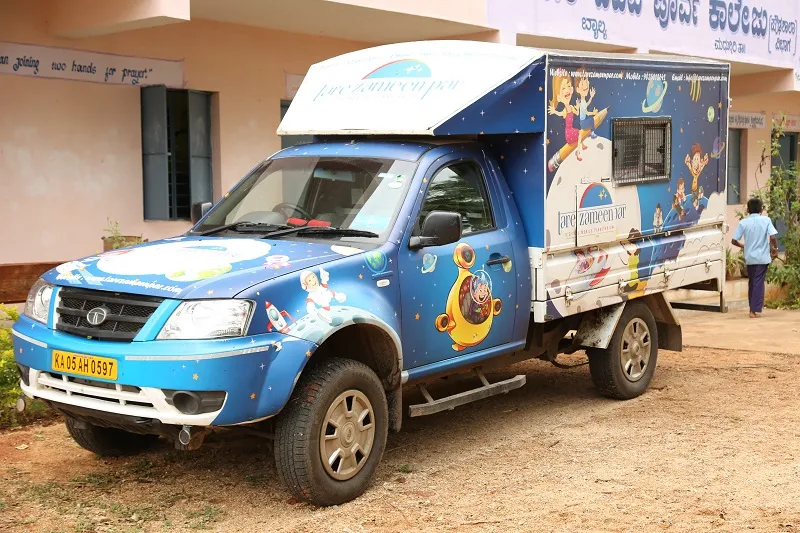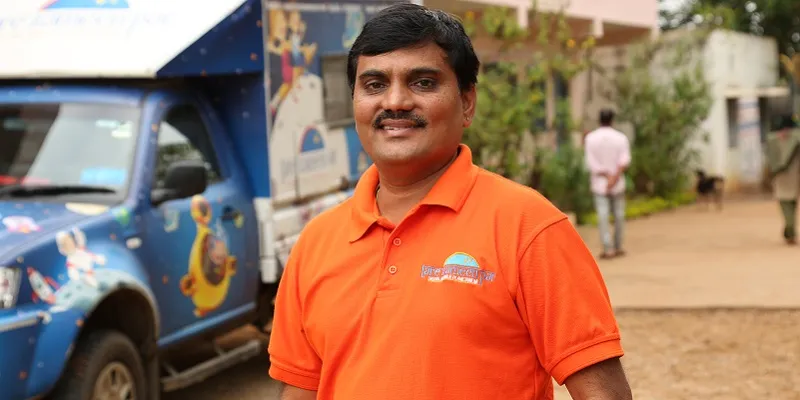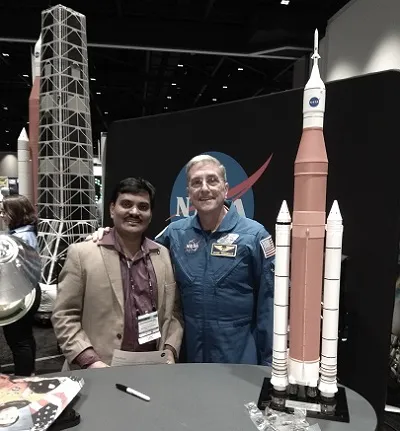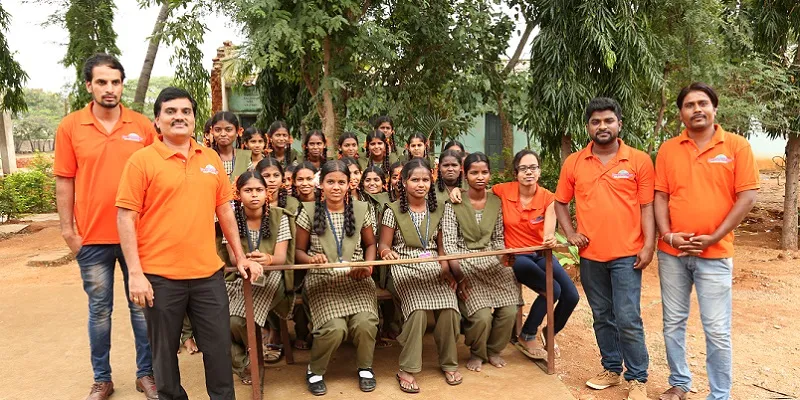A planetarium in my classroom: TareZameenPar brings the marvels of outer space to lakhs of students in rural Karnataka
A mobile planetarium from a Bengaluru-based startup provides students in rural areas with a fully immersive experience of outer space. Its founder hopes it will ignite their curiosity for learning applied sciences and give the students career opportunities they have never considered before.
It is Friday morning and the Class 8 students at the government-run school in Byala village of Tumakuru district in Karnataka are looking forward to a journey through the stars. The nearest planetarium is over 100 km away in Bengaluru, and yet the neat lines they form in the school playground are not to board a bus. They’re only being divided into batches to make sure they fit into the planetarium.
You see, a planetarium has come to their doorstep today. This is no makeshift arrangement with a video played on a TV screen. Instead, the students walk into an indoor dome and settle down to watch the shows projected onto a domed screen – just like in a regular planetarium – and enjoy a fully immersive experience in the wonders of the cosmos.

The initiative, called TareZameenPar (TZP), from Varnaaz Technologies, has conducted thousands of shows for lakhs of students in schools in rural areas all across the state in the past year. It has six such mobile planetariums, each outfitted to carry all the equipment needed to run a show – a genset, portable air-conditioners, two inflatable domes, a GPS, a solar-powered UPS, the special projectors, all the software, and of course trained personnel.
For Founder Dinesh Badagandi, TZP is an attempt to give back to society. A successful serial entrepreneur with multiple tech ventures to his credit, this is his latest baby. Born to a middle-class family in northern Karnataka, Dinesh says he was fortunate to get an admission to Sainik School Bijapur. He went on to study mechanical engineering at Bagalkot and got an MBA from Karnatak University, Dharwad, in 1997.
It may have been the height of the IT boom but getting into the IT sector with a degree in mechanical engineering wasn’t easy. His first job was selling filters to garages up and down NH4. A chance walk-in interview with Zensar Technologies the next year saw him get a job with the IT company and the same killer instinct that had made him a top salesman earlier saw him transferred to Dubai for a better role within Zensar.
From engineer to entrepreneur
During his next stint with US-based startup iCelerate, he turned down the opportunity to be a co-founder with an ex-colleague. iCelerate was eventually acquired, and Dinesh left soon after. That same ex-colleague, Rishi Khosla, called once more in 2007, offering him an ERP project at his company. There was just one challenge – Dinesh was an individual and not a company. His Chartered Accountant suggested buying a private registered company.
“I bought it for Rs 1 lakh with no guarantee of business because the board of directors of Copal Partners would make the final decision,” says Dinesh, “And that’s how I became an entrepreneur.”
VizionARK, as it was renamed, executed ERP implementation projects and became Microsoft Dynamics’ implementation partner in India. It was a good run until the 2008 credit crisis struck, clients couldn’t pay up and their sales pipeline dried up. Dinesh finally sold 80 percent of his stake in VizionARK and stayed on only to complete the handover.
Returning to his roots
At this time, he was frequently traveling to north Karnataka to meet family and friends. During these visits, he realised that engineering graduates and MBAs from the region were having a tough time getting jobs in big cities. This led him and a few friends to set up the Uttara Karnataka Job Assistance Forum (UKJAF), which has trained and placed 2,000 graduates. Students began asking for more, and the entrepreneur in Dinesh saw the business potential in corporate training.
“Many of our business schools offer no practical training. The closest a student gets to a practical experience is a case study,” he says.
And so, he drew from his experience in ERP implementation to design training modules for hands-on experience of basic business functions. The result was a finishing school for graduates and MBAs under the banner of Vernaaz Technologies Pvt Ltd. The informal, not-for-profit effort under UKJAF continued.
Yet, Dinesh felt something had to be done to bridge the gap between rural and urban students at the school level itself. The real problem was that they couldn't understand scientific concepts well because they had no hands-on experience. “They don’t think of getting admission into IIT, the ITI is their limit. I have always wanted to change that,” he says.

Bringing the stars within reach
With the savings from his time abroad, Dinesh hit upon the idea of a “Lab on Wheels” that would go to students and give them a first-hand experience of science and how to apply it. After more research, he decided on a planetarium-like experience thanks to the availability of digital planetarium content (as against the optomechanical setup that is not suited for frequent transport). He travelled to China to get customised inflatable domes.
Soon, he had a proof-of-concept programme running in the villages of Chikkaballapur district north of Bengaluru. The mobile planetarium and Lab on Wheels reached 12,000 students in just one district. “We even organised night-sky-gazing sessions with the telescope we had. A local landlord would sponsor dinner and everyone would come to the school to see the stars,” says Dinesh. “It was like a festival.”
When he heard about the Karnataka IT Department’s ELEVATE 100 programme for startups, he applied for a grant. His in-person presentation, however, did not go as planned.
“I assumed we would be able to carry and show supporting material. But I had to explain everything verbally,” he recalls. Instead of the standard 15 minutes and Q&A at the end, the jury began asking questions right from the beginning: “I came away feeling dejected.”
So, when Dinesh received a phone call telling him that his proposal for a mobile planetarium had won the grant, he could hardly believe his luck. “The Rs 30-lakh grant we received gave us a big impetus to build the first fully outfitted prototype.”
Just a little while later, he got the news that the Karnataka Science and Technology Promotion Society (KSTePS) too had accepted their proposal to build and operate five such mobile planetariums.
What makes TZP's mobile planetarium unique
While TZP is not the first mobile planetarium, it is more than just that. This Lab-on-Wheels is a one-day programme is dubbed the Science Utsav. Students first see a short film on the basics of astronomy, including the superstitions surrounding the alignment of various planets and stars. Then they see a demonstration of applied science through experiments covering refraction, reflection, solar energy and its applications, etc.
“The practical experiments mean they understand the concepts better than from their textbooks. We also tell them about career options they can explore after school,” says Dinesh.
After this, they visit the ‘planetarium’ set up in a classroom, where they see films on the cosmos – stars, comets, asteroids, black holes, and more. TZP has 60 shows and adds more regularly. Many shows are approved by the Department of State Education Research and Training (DSERT) for various classes. “We also have shows related to wildlife and the oceans. Schools can choose their topics,” says Dinesh.
Before the Science Utsav ends, TZP runs another demo of advanced experiments for a select group of the brightest, most enthusiastic students. The cost for the whole programme is Rs 100-120 per student, depending on the size of the batch.

Content is king
A proud addition to their library is a film on the Indian space research programme, which they put together based on suggestions from former ISRO Chairman, the late Dr U R Rao. The current ISRO Chairman too felicitated them on National Science Day in 2017.
TZP gets much of its content from Evans and Sutherland, a world leader in digital planetariums. It is reportedly the only one providing content in 8K resolution, the highest ultra-definition standard available in digital cinematography. Once he licensed the content, Dinesh had the scripts translated and dubbed into Kannada.

A pat on the back from NASA (and more)
For ELEVATE 100 winners, the Karnataka government offers to reimburse 50 percent of expenses incurred to participate in trade shows. Dinesh took the opportunity to attend the annual conference of the Association of Science Technology Centers (ASTC) in San Jose, California, last year. It was where US space agency NASA had an outreach programme running.
The go-getter that he is, Dinesh told them about TZP and received rave reviews from former NASA astronaut Don Thomas (who was part of shuttle missions alongside Indian-origin astronaut Kalpana Chawla).
While there, Dinesh also brought on board ISS Above, a device that brings the goings-on at the International Space Station onto your TV screen. It streams screens full of information and live views of Earth from external cameras. Liam Kennedy, inventor of ISS Above, was happy to tell KSTEPS and TZP what a great job they were doing.
Towards the next orbit
So far, TZP has conducted shows for over 3 lakh students and 20,000 other people. Within Karnataka, it is hoping to expand its fleet with support from KSTePS. It is also working out ways to reach rural students in other states via CSR programmes.
Back at the school in Byala, students finish watching the films and the experiments, getting their first taste of applied sciences. Abhishek of Class 8 says he got to see planets, stars, the moon, the solar system, galaxies, comets and so much more.
“I don’t have to go to Bengaluru to see this now. I’m so happy you came here. You saved us the trouble of going all the way,” he states, adding, “I couldn’t understand these things when I read about them. This way, it’s so much easier.”

For the unassuming Dinesh, such reactions are reassurance that his mission is on track: “When we were in school, my brother and I would compare ourselves with those who went to school in the city, the way they spoke, the way the behaved. We were somehow a little less confident when we were around them. It has been my lifelong dream to do something for rural students.”
“It has been a great journey,” he adds – one that has just begun, for him and for the lakhs of students he has set out to help.







